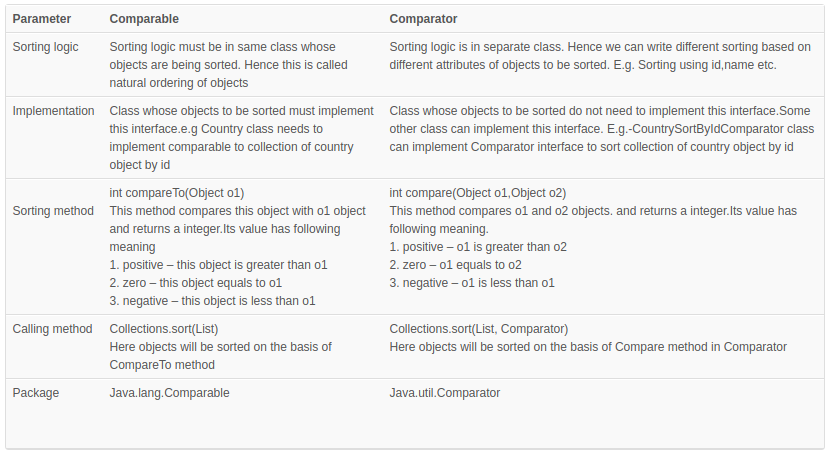One of the common interview question is ‘What are differences between Comparator and Comparable’. or ‘How will you sort collection of employee objects by its id or name’.For that we can use two interfaces.i.e. Comparator and Comparable.Before we actually see differences,let me give you brief introduction of both.
Comparable interface: Class whose objects to be sorted must implement this interface.In this,we have to implement compareTo(Object) method.
For example:
public class Country implements Comparable {
@Override
public int compareTo(Object arg0) {
Country country=(Country) arg0;
return (this.countryId < country.countryId ) ? -1: (this.countryId > country.countryId ) ? 1:0 ;
}} If any class implements comparable inteface then collection of that object can be sorted automatically using Collection.sort() or Arrays.sort().Object will be sort on the basis of compareTo method in that class.
Objects which implement Comparable in java can be used as keys in a SortedMap like TreeMap or SortedSet like TreeSet without implementing any other interface.
Comparator interface: Class whose objects to be sorted do not need to implement this interface.Some third class can implement this interface to sort.e.g.CountrySortByIdComparator class can implement Comparator interface to sort collection of country object by id. For example:
public class CountrySortByIdComparator implements Comparator<Country> {
@Override
public int compare(Country country1, Country country2) {
return (country1.getCountryId() < country2.getCountryId() ) ? -1: (country1.getCountryId() > country2.getCountryId() ) ? 1:0 ;
}
}Using Comparator interface,we can write different sorting based on different attributes of objects to be sorted.You can use anonymous comparator to compare at particular line of code. For example:
Country indiaCountry=new Country(1, 'India');
Country chinaCountry=new Country(4, 'China');
Country nepalCountry=new Country(3, 'Nepal');
Country bhutanCountry=new Country(2, 'Bhutan');
List<Country> listOfCountries = new ArrayList<Country>();
listOfCountries.add(indiaCountry);
listOfCountries.add(chinaCountry);
listOfCountries.add(nepalCountry);
listOfCountries.add(bhutanCountry);
//Sort by countryName
Collections.sort(listOfCountries,new Comparator<Country>() {
@Override
public int compare(Country o1, Country o2) {
return o1.getCountryName().compareTo(o2.getCountryName());
}
});
Comparator vs Comparable

Java code:
For Comparable: We will create class country having attribute id and name.This class will implement Comparable interface and implement CompareTo method to sort collection of country object by id.
Country.java
//If this.cuntryId < country.countryId:then compare method will return -1
//If this.countryId > country.countryId:then compare method will return 1
//If this.countryId==country.countryId:then compare method will return 0
public class Country implements Comparable{
int countryId;
String countryName;
public Country(int countryId, String countryName) {
super();
this.countryId = countryId;
this.countryName = countryName;
}
@Override
public int compareTo(Object arg0) {
Country country=(Country) arg0;
return (this.countryId < country.countryId ) ? -1: (this.countryId > country.countryId ) ? 1:0 ;
}
public int getCountryId() {
return countryId;
}
public void setCountryId(int countryId) {
this.countryId = countryId;
}
public String getCountryName() {
return countryName;
}
public void setCountryName(String countryName) {
this.countryName = countryName;
}
}ComparatorMain.java
import java.util.ArrayList;
import java.util.Collections;
import java.util.List;
public class ComparatorMain {
/**
* @author Arpit Mandliya
*/
public static void main(String[] args) {
Country indiaCountry=new Country(1, 'India');
Country chinaCountry=new Country(4, 'China');
Country nepalCountry=new Country(3, 'Nepal');
Country bhutanCountry=new Country(2, 'Bhutan');
List<Country> listOfCountries = new ArrayList<Country>();
listOfCountries.add(indiaCountry);
listOfCountries.add(chinaCountry);
listOfCountries.add(nepalCountry);
listOfCountries.add(bhutanCountry);
System.out.println('Before Sort : ');
for (int i = 0; i < listOfCountries.size(); i++) {
Country country=(Country) listOfCountries.get(i);
System.out.println('Country Id: '+country.getCountryId()+'||'+'Country name: '+country.getCountryName());
}
Collections.sort(listOfCountries);
System.out.println('After Sort : ');
for (int i = 0; i < listOfCountries.size(); i++) {
Country country=(Country) listOfCountries.get(i);
System.out.println('Country Id: '+country.getCountryId()+'|| '+'Country name: '+country.getCountryName());
}
}
}Output:
Before Sort :
Country Id: 1||Country name: India
Country Id: 4||Country name: China
Country Id: 3||Country name: Nepal
Country Id: 2||Country name: Bhutan
After Sort :
Country Id: 1|| Country name: India
Country Id: 2|| Country name: Bhutan
Country Id: 3|| Country name: Nepal
Country Id: 4|| Country name: ChinaFor Comparator: We will create class country having attribute id and name and will create another class CountrySortByIdComparator which will implement Comparator interface and implement compare method to sort collection of country object by id and we will also see how to use anonymous comparator.
Country.java
public class Country{
int countryId;
String countryName;
public Country(int countryId, String countryName) {
super();
this.countryId = countryId;
this.countryName = countryName;
}
public int getCountryId() {
return countryId;
}
public void setCountryId(int countryId) {
this.countryId = countryId;
}
public String getCountryName() {
return countryName;
}
public void setCountryName(String countryName) {
this.countryName = countryName;
}
}CountrySortbyIdComparator.java
import java.util.Comparator;
//If country1.getCountryId()<country2.getCountryId():then compare method will return -1
//If country1.getCountryId()>country2.getCountryId():then compare method will return 1
//If country1.getCountryId()==country2.getCountryId():then compare method will return 0
public class CountrySortByIdComparator implements Comparator<Country>{
@Override
public int compare(Country country1, Country country2) {
return (country1.getCountryId() < country2.getCountryId() ) ? -1: (country1.getCountryId() > country2.getCountryId() ) ? 1:0 ;
}
}ComparatorMain.java
import java.util.ArrayList;
import java.util.Collections;
import java.util.Comparator;
import java.util.List;
public class ComparatorMain {
/**
* @author Arpit Mandliya
*/
public static void main(String[] args) {
Country indiaCountry=new Country(1, 'India');
Country chinaCountry=new Country(4, 'China');
Country nepalCountry=new Country(3, 'Nepal');
Country bhutanCountry=new Country(2, 'Bhutan');
List<Country> listOfCountries = new ArrayList<Country>();
listOfCountries.add(indiaCountry);
listOfCountries.add(chinaCountry);
listOfCountries.add(nepalCountry);
listOfCountries.add(bhutanCountry);
System.out.println('Before Sort by id : ');
for (int i = 0; i < listOfCountries.size(); i++) {
Country country=(Country) listOfCountries.get(i);
System.out.println('Country Id: '+country.getCountryId()+'||'+'Country name: '+country.getCountryName());
}
Collections.sort(listOfCountries,new CountrySortByIdComparator());
System.out.println('After Sort by id: ');
for (int i = 0; i < listOfCountries.size(); i++) {
Country country=(Country) listOfCountries.get(i);
System.out.println('Country Id: '+country.getCountryId()+'|| '+'Country name: '+country.getCountryName());
}
//Sort by countryName
Collections.sort(listOfCountries,new Comparator<Country>() {
@Override
public int compare(Country o1, Country o2) {
return o1.getCountryName().compareTo(o2.getCountryName());
}
});
System.out.println('After Sort by name: ');
for (int i = 0; i < listOfCountries.size(); i++) {
Country country=(Country) listOfCountries.get(i);
System.out.println('Country Id: '+country.getCountryId()+'|| '+'Country name: '+country.getCountryName());
}
}
}Output:
Before Sort by id :
Country Id: 1||Country name: India
Country Id: 4||Country name: China
Country Id: 3||Country name: Nepal
Country Id: 2||Country name: Bhutan
After Sort by id:
Country Id: 1|| Country name: India
Country Id: 2|| Country name: Bhutan
Country Id: 3|| Country name: Nepal
Country Id: 4|| Country name: China
After Sort by name:
Country Id: 2|| Country name: Bhutan
Country Id: 4|| Country name: China
Country Id: 1|| Country name: India
Country Id: 3|| Country name: Nepal

如果长时间无法加载,请针对 disq.us | disquscdn.com | disqus.com 启用代理